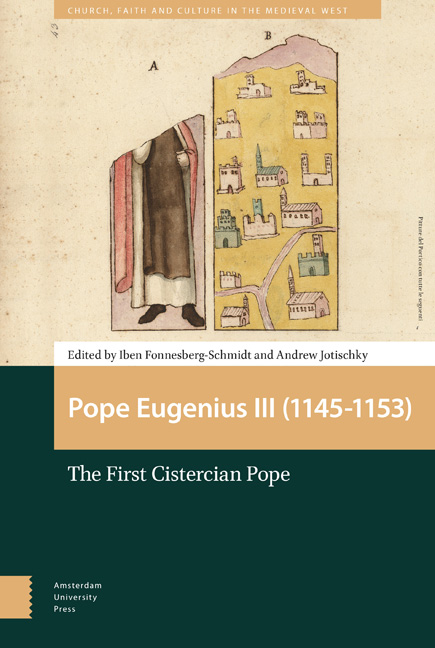Book contents
- Frontmatter
- Contents
- Preface
- Abbreviations
- Maps and Figures
- Introduction
- 1 ‘Justinian’s Laws, not the Lord’s’: Eugenius III and the Learned laws
- 2 Curial Politics and Papal Power : Eugenius III, the Curia, and Contemporary Theological Controversy
- 3 The Cistercians, Eugenius III, and the Disputed York Election
- 4 Eugenius III and the Crusades to the East
- 5 Eugenius III and the Northern Crusade
- 6 The Benefits of Exile
- 7 Eugenius III and France: the Protected Protector
- 8 A Golden Rose and the Deaf Asp that Stoppeth her Ears: Eugenius III and Spain
- 9 Eugenius III and the Roman Commune
- 10 Eugenius III Reclaims the Patrimony of St Peter
- 11 Eugenius III’s Privileges to Cistercian Houses
- 12 Eugenius III at Cîteaux, 1147
- 13 Eugenius III and the Church in the Crusader States
- Index
1 - ‘Justinian’s Laws, not the Lord’s’: Eugenius III and the Learned laws
Published online by Cambridge University Press: 22 December 2020
- Frontmatter
- Contents
- Preface
- Abbreviations
- Maps and Figures
- Introduction
- 1 ‘Justinian’s Laws, not the Lord’s’: Eugenius III and the Learned laws
- 2 Curial Politics and Papal Power : Eugenius III, the Curia, and Contemporary Theological Controversy
- 3 The Cistercians, Eugenius III, and the Disputed York Election
- 4 Eugenius III and the Crusades to the East
- 5 Eugenius III and the Northern Crusade
- 6 The Benefits of Exile
- 7 Eugenius III and France: the Protected Protector
- 8 A Golden Rose and the Deaf Asp that Stoppeth her Ears: Eugenius III and Spain
- 9 Eugenius III and the Roman Commune
- 10 Eugenius III Reclaims the Patrimony of St Peter
- 11 Eugenius III’s Privileges to Cistercian Houses
- 12 Eugenius III at Cîteaux, 1147
- 13 Eugenius III and the Church in the Crusader States
- Index
Summary
Abstract
Bernard of Clairvaux famously condemned Eugenius III for allowing trained lawyers using ‘Justinian's Laws, not the Lord’s’ to present and defend cases in his presence. This chapter argues that Bernard's strictures were misplaced, since the papal court followed rather than set the trend towards greater professionalization already evident in Tuscany, Lombardy, and Provence. In these regions, elements of Roman civilian procedure were commonplace with advocates and jurists citing Justinian's Codex and Digest. When necessary, they drew on authorities from Gratian's Decretum, the new compendium of canon law, which incorporated significant elements of Roman law. A series of individual cases provides evidence of the intermingling of the two laws in what was becoming the ius commune (common law) of the Latin Church.
Keywords: Roman law; canon law; Gratian, Justinian; decretals; oath of calumny; ordo iudiciarius; ius commune; Council of Reims (1148)
The legal background
It is well known that two of Eugenius III's most distinguished contemporaries wrote with some disquiet about the direction being taken by legal practice at the papal Curia. Bernard of Clairvaux, who had recruited Eugenius into the Cistercian Order in 1138, complained in ‘Five Books on Consideration’, that ‘every day the laws make a great clamour in the [papal] palace, but they are Justinian's laws, not the Lord's (quotidie perstrepunt in palatio leges, sed Iustiniani, non Domini)’; and Master Gerhoch, provost of Reichersberg (†1169), claimed (1155/6) that lawyers (legiste) were allowed so to complicate the presentation of cases heard in his presence that Eugenius and the cardinals were scarcely able to disentangle them. ‘It would then have been better’, he added, ‘if those blood-sucking dog-flies (cinomias) sent into Pharaoh's house had not been introduced into the house of Jacob’. The pure law of the Gospels was being perverted by the empty arguments of the Roman law. ‘I am amazed’, wrote Bernard, ‘how far your religious ears can bear to listen to such arguments from advocates, and the battles of words, which are more conducive to the subversion of truth than to its discovery.’
- Type
- Chapter
- Information
- Pope Eugenius III (1145–1153)The First Cistercian Pope, pp. 27 - 68Publisher: Amsterdam University PressPrint publication year: 2018

